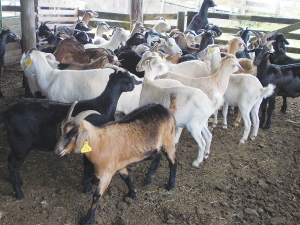New export records for Aussie goatmeat
The Australian goatmeat industry set a new record for production and exports last year.
 Goat meat has no age, sex or carcase finish specifications and consistently stable schedule value between 8 and 18 kg.
Goat meat has no age, sex or carcase finish specifications and consistently stable schedule value between 8 and 18 kg.
Goats can add simple and low-cost production benefits to bottom-line profitability for sheep and beef operations, explains Garrick Batten.
Our feral goats are low-cost breeding stock with a widespread genetic base to work with.
Mated to appropriate bucks, they are just as suitable as other breeds. Controlled by relatively cheap effective electric fencing when trained, they can be handled on the few needed occasions in existing facilities with only minor modifications.
Sheep farmers most enjoy working with animals and producing healthy stock. They least enjoy animal health problems, dagging, docking, dipping and repeat manual work.
Appropriate goat grazing management significantly reduces or eliminates sheep drenching at $2.20 per SU, no wool shearing, tailing, dagging at $3 per SU, disease or pregnancy testing or even vaccinations in the yards. No viral pneumonia, flystrike, bearings, cast ewes, reproductive difficulties, facial eczema to monitor and cure. Easier and quicker mustering and yard work with intelligent, easily trained goats.
Feed cost is directly related to goat stocking rate per ha. Free-ranging low numbers have minimal additional feed cost. Adding 10% of goat LW to existing farm stock LW, will mainly eat unused and currently wasted feed on hill country. Clover percentage in mixed pasture will improve over time at no cost and can be increased by 25%-plus with more concentrated goat rotational grazing. Measuring that benefit from improved feed quality in other stock is difficult, but increased store lamb weight from 23-29kg on clover enhanced pastures could add $25 per head and earlier disposal.
Goats have a key biological weed control of environmental benefits without chemical and diesel use. There’s also no work safety and application timing considerations costs, but income from four-legged control. Even one thistle per 10m² reduces pasture by 8%. Goats also control scrub weeds as well.
Farmers compare meat prices based on their experienced knowledge of animals, products and markets. Goat meat has no age, sex or carcase finish specifications and consistently stable schedule value between 8 and 18 kg. Being able to use goats as a flying herd to reduce farm stock levels for any climatic reason – without price penalty – can be a significant management advantage.
Goats can have other advantages over cattle to groom longer pasture. As they do not like water, even the $5 per metre, two-wire cattle fence and alternative water sources are not required for waterway exclusion.
There is also no NAIT, TB or pregnancy testing expensive handling equipment. No pasture treading damage in winter with lower hoof pressure. Urine patches are spread more, less intense, with reduced N loss and contamination.
All animals die and have health problems by the head, so such events are significantly more important with cattle. Cattle reproductive rate, and capital and husbandry costs comparisons are magnified by the goat alternative.
• Garrick Batten is a lifetime commercial goat industry expert and published author. More information: www.caprinexnz.com
Could a breakthrough in fermentation create a new multi-million-dollar export market for shiitake mushroom extracts into China?
Meadow Fresh has created the world's first fantasy sports league powered by real cows.
This year, 'Foodie February' sees potatoes take the spotlight as one of New Zealand's most powerful and versatile food heroes.
A multi-cultural team is helping to establish one of New Zealand's largest plantings of premium eating grapes - while learning each other's languages and cultures along the way.
The World Wide Sires National All Day Breeds Best Youth Camp Best All Rounder plaudit has become family affair, with 2026 Paramount Cup winner Holly Williams following in her sister Zara's footsteps.
DairyNZ is giving New Zealand farmers a unique opportunity to gain hands-on governance and leadership experience within the dairy sector.